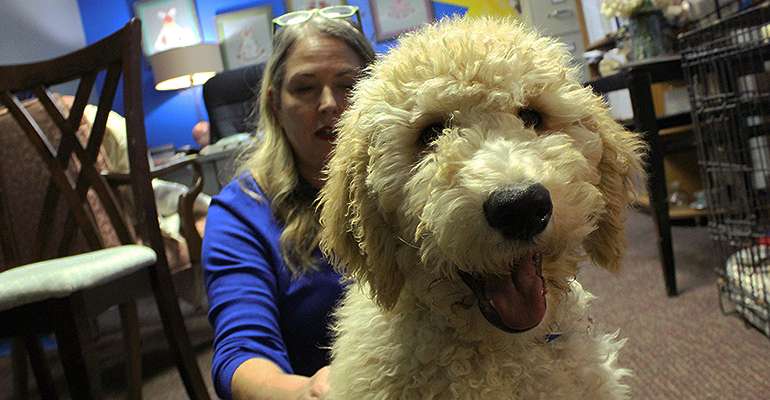
By CRISTINA JANNEY
Hays Post
An abandoned goldendoodle puppy who was given a second lease on life thanks to a local rescue is now in training to help others grasp new lives themselves.
Fonzie, who is estimated to be four or five months old, was a part of a litter of four puppies who were found abandoned about a month ago outside of Hays. They were turned in to the Humane Society of the High Plains. The other three dogs were adopted by private individuals.
Options Domestic and Sexual Violence Services was looking to replace its therapy dog, Sunny, a golden retriever, who was ready for retirement. Sunny worked at Options for three years as a therapy dog.
Once he is fully trained, Fonzie will be working with Options clients, both adults and children, visiting the Options shelter and making appearances at community events.
"Some of the support they need is just reconnecting with a soft, furry friend," Jennifer Hecker, Options executive director, said. "Often survivors have to leave their pets behind when they leave, so that is a loss they feel."
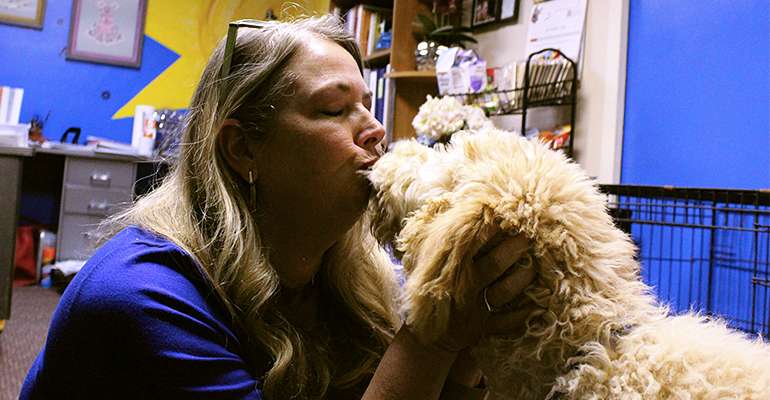
Hecker told the story of one boy who was having a very difficult time talking about what happened to him and his family.
"About the third session, I introduced him to Sunny. It was like working with a different little boy," she said. "We talked about who our friends are. We talked a lot about trust. We talked about how dogs are really good secret keepers.
"In that session, he laid down on the floor and picked up Sunny's ear and whispered every terrible, awful thing that had happened to him, that had happened to his mother and his sisters, everything that he had seen and experienced.
"I still get really emotional thinking about it," Hecker said.
After the boy had the breakthrough with Sunny, he was able to make strides quickly and more easily talk about what happened to him.
"Dogs don't judge. Dogs don't blame. Dogs love you unconditionally," Hecker said. "I think when people experience domestic violence in particularly, they don't have those experiences. A furry friend is someone you can tell those things to."
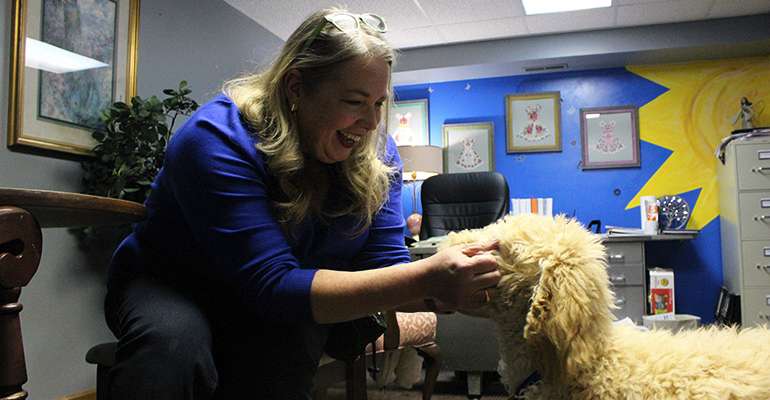
In a similar instance, a rape survivor was also having difficultly talking about the attack against her. She would shake and cry when she tried to talk about the rape. The dog helped her open up. She would take all her nervous energy and stroke Sunny and talk to Sunny, Hecker said.
"When it was difficult for her to say something, she often said it through the dog. The dog was there to validate her feelings. She would say, 'You understand what I mean, don't you, Sunny?' and she would give him a hug," Hecker said.
"She was able to keep moving because she knew that was someone who would not judge or blame her."
Hecker said people often have an immediate bond with pets, especially dogs.
"I think that is one of the reasons why pet therapy is so powerful," she said. "I think it is innate. I think it is a part of who we are to have a connection with animals."

Hecker said the staff also benefits from having a therapy dog in the office.
"Sometimes when the staff are working with people with very difficult cases, they take on some of the emotional pain the survivors are feeling," she said. "Therapy dogs are also really great for staff to help them decompress after a particularly difficult case they are working with."

Goldendoodles are known for being the fourth smartest dog breed, learning quickly, being very good with children and being very gentle, Hecker said.
Fonzie is named after character Arthur Fonzarelli, on TV's "Happy Days." He has been spending half days training with Hecker at the Options office. When he is not on the job, he is a family pet at the Hecker home.
As Fonzie, a soft, blonde bundle of playful energy, rolled around on the floor and tried to eat leaves, Hecker explained Fonzie will be working on obedience training and socialization for at least six to eight months before he is ready to meet clients.
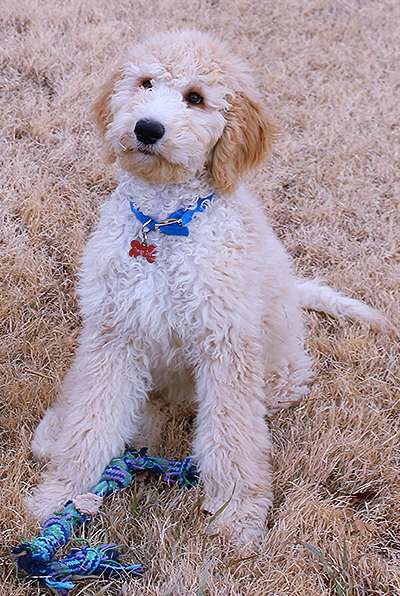
"He needs to learn to be a polite dog and not jump on people or not nibble hands when you pet him," she said.
Fonzie's training will then progress to distraction training. He will have to learn to be around a lot of movement, loud noises and people coming and going from the Options building.
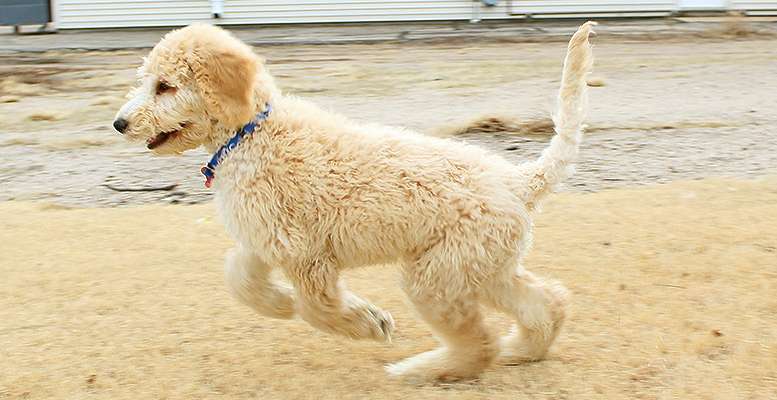
Fonzie will be a therapy dog, which is different than a service dog. Service dogs are trained to perform specific tasks for their handlers, such as alerting a handler of an oncoming seizure, serving as a guide dog or alerting to low blood sugar, Hecker said.
Therapy dogs are pets who provide emotional support and comfort, usually to more than one person.
"Often people think what we do is to rescue our victims, and that is not what we do," Hecker said. "Victims rescue themselves. Our job is to give them the life preserver that they need to cling on to along the way. There is something really beautiful that comes full circle that the dog—he is a rescue pet, and he is helping people rescue themselves.
"I think that is just a beautiful, beautiful thing to offer to the victims and survivors that we work with."
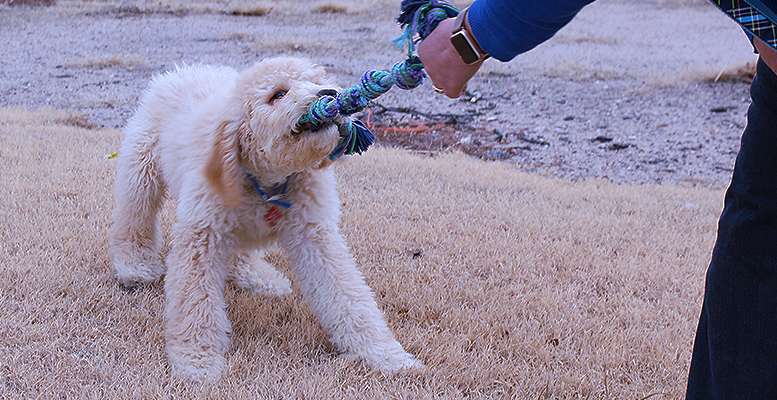
In Fonzie's honor, Options had a pet supply drive on Giving Tuesday. Those items were donated to the Humane Society of the High Plains, who aided in Fonzie's rescue.
Jessica Freib, Humane Society shelter assistant manager, said the story of the abandoned pups has ended happily.
"Any time a dog gets adopted it makes you feel pretty good," she said. "To know [Fonzie] is helping out, women and children in our community and even men who have gone through all the terrible things that can happen—sexual assault and domestic abuse and even sex trafficking—makes you feel good.
"In a small way you feel like you have done a good job for not only the dog, but for the community and the people too."






